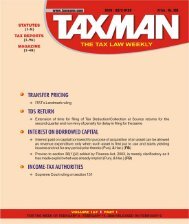CPT V24P7-Art1 (Content).pmd - Taxmann
CPT V24P7-Art1 (Content).pmd - Taxmann
CPT V24P7-Art1 (Content).pmd - Taxmann
Create successful ePaper yourself
Turn your PDF publications into a flip-book with our unique Google optimized e-Paper software.
Direct Tax Laws<br />
4. GENERAL PRACTICES FOLLOWED IN<br />
DEALING WITH THE APPLICATIONS FOR<br />
STAY OF DEMAND<br />
4.1 Such requests are generally rejected without<br />
hearing the assessee - Such requests are generally<br />
rejected without hearing the assessee. The legal<br />
view is that as the exercise of discretion by<br />
the AO under section 220(6) is quasi-judicial<br />
function and he has to exercise his power<br />
fairly and reasonably and not arbitrarily or<br />
capriciously, the AO should give reasons for<br />
dismissing an application made by an assessee<br />
in his discretion and should also hear the<br />
assessee – Seth Gopaldas Paliwal v. WTO [1983]<br />
139 ITR 900(MP). Moreover, the order should<br />
be a speaking order – Teletube Electronics Ltd.<br />
v. CIT [1998] 96 Taxman 278 (Delhi); Chesebrough<br />
Pond’s Inv. v. A.A.C. (C.T.) [1973] 32 STC 464<br />
(Mad.).<br />
4.2 Such applications are also rejected on the<br />
ground of assessee’s sound financial position -<br />
Such applications are also rejected on the ground<br />
that the assessee’s financial position is sound<br />
against legal views. Normally, once the officer<br />
is satisfied that an appeal has been filed (and<br />
the grounds are not frivolous), he has to treat<br />
the assessee as not in default to the extent of<br />
the portion of tax disputed in the appeal. Though<br />
section 220(6) does not indicate in what cases<br />
denial of discretion shall be justified, yet the<br />
fact that the assessee is financially sound and<br />
is in a position to pay is not in itself a ground<br />
for refusing to exercise the discretion in granting<br />
the stay – R.P. David v. Ag. ITO [1972] 86 ITR<br />
699 (Mad.).<br />
4.3 Stay applications are disposed of without<br />
passing a speaking order - Stay applications<br />
are, many a times, disposed of without passing<br />
a speaking order and such orders even get<br />
approved by the higher authorities. In one<br />
case, relating to stay of demand, the AO passed<br />
an order on a detailed application by the taxpayer<br />
as to why demand should be stayed till the<br />
disposal of appeal as under:<br />
640<br />
“Stay of demand is not automatic as a<br />
result of filing of first appeal before CIT(A).<br />
In view of above, your request for keeping<br />
the demand in abeyance till the disposal<br />
of the appeal by the CIT(A) is rejected<br />
and you are directed to pay the entire<br />
demands within 10 days of the receipt of<br />
this letter. Non-compliance will lead to<br />
actions as per provisions of IT Act without<br />
any further reference”.<br />
CIT’s order:<br />
When the taxpayer appealed to the CIT against<br />
the AO’s decision, the CIT passed a still short<br />
and cryptic order to the following effect<br />
communicated to the taxpayer by an officer<br />
in his office-<br />
“I am directed to inform you that your<br />
request for stay of demand for the above<br />
mentioned two years has not been acceded<br />
to by the CIT…. You are, therefore,<br />
requested to make necessary correspondence<br />
with the AO in the matter of payment<br />
of the outstanding demand immediately.”<br />
4.4 Often cryptic orders are passed by Assessing<br />
Officers and Commissioners - In cases, related<br />
to stay of demand, often cryptic orders are<br />
passed by the AOs and Commissioners without<br />
assigning any reasons, just saying ‘refused’/<br />
‘rejected’, etc., without stating as to why the<br />
prayer mentioned in the assessee’s application,<br />
giving varied reasons for staying demand, are<br />
not acceptable.<br />
WHY CIT(A) ARE NOT STAYING<br />
DEMANDS?<br />
August 1 to 15, 2012 u TAXMANN’S CORPORATE PROFESSIONALS TODAY u Vol. 24 u 20<br />
5. The foregoing discussion candidly shows<br />
that authorities functioning on the administrative<br />
side are most reluctant to favourably consider<br />
applications for stay of demand during the<br />
pendency of appeals, ignoring the legal<br />
requirements of section 220(6) [supra]. Even if<br />
these are taken up, the orders on the same are<br />
not passed judiciously. There could be some<br />
grounds for the AOs/CIT(A) on the administration<br />
side not to accept such requests because<br />
of their concern/enthusiasm for meeting the<br />
budget targets fixed for them by the CBDT,











![“FORM NO. 3CEB [See rule 10E] Report from an ... - Taxmann](https://img.yumpu.com/45480232/1/190x245/form-no-3ceb-see-rule-10e-report-from-an-taxmann.jpg?quality=85)





